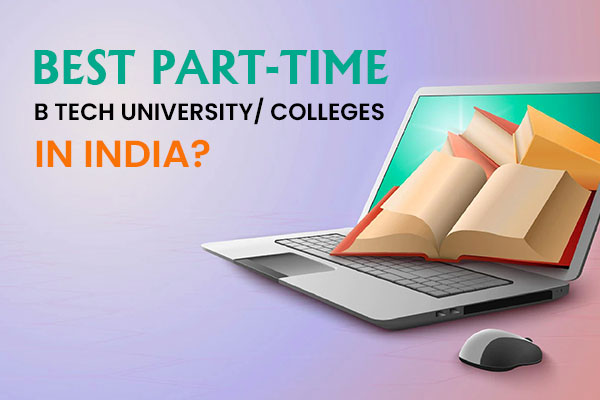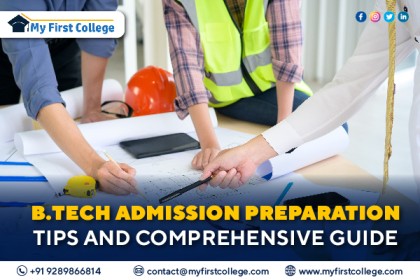B.Tech Admission preparation Tips and Comprehensive Guide
India Education system has given us a very solid foundation in terms of B.Tech or Bachelor of Technology, which is an undergraduate academic degree, awarded in the field of engineering and technology and is taken up by the students who want to pursue a career in engineering.
For taking up examination for B.Tech admission the students need to pass their 12th standard examination with a science background. They need to appear for entrance exams like JEE (Joint Entrance Exam) or state-level entrance exams, depending on the college and program they are applying to.
There are several specializations available in B.Tech, such as Computer Science, Electronics and Communication, Mechanical, Civil, Chemical, and many more. The duration of the program is typically four years, with eight semesters. B.Tech graduates in India can find employment opportunities in various industries such as IT, manufacturing, construction, research and development, telecommunications, and many more.
In India, there are several admission tests for B.Tech programs that are conducted at the national and state level. The most popular and commonly accepted entrance exam for B.Tech programs is the Joint Entrance Examination (JEE), which is conducted by the National Testing Agency (NTA) on behalf of the Ministry of Education.
The JEE has two phases JEE Main and JEE Advanced. JEE Main is conducted twice a year, and it is the qualifying exam for JEE Advanced. The JEE Main Exam has multiple-choice questions based on physics, chemistry, and mathematics. The exam is conducted online and offline, and the duration of the exam is three hours.
Apart from JEE, several state-level entrance exams are conducted for admission to B.Tech programs in state government and private colleges. Some popular state-level exams are:
- Maharashtra Common Entrance Test (MHT CET)
- Andhra Pradesh Engineering, Agriculture and Medical Common Entrance Test (AP EAMCET)
- Karnataka Common Entrance Test (KCET)
- Tamil Nadu Engineering Admissions (TNEA)
The eligibility criteria for these exams may vary, but generally, candidates must have completed their 12th standard with a science background and a minimum percentage of marks to be eligible to apply. In addition to these exams, some private universities also conduct their entrance tests for admission to B.Tech programs.
Here are Some Tips to crack the B.Tech Admission Exam in India:
1. Understand the Exam Pattern and Syllabus:Start by understanding the exam pattern and syllabus for the exam. Knowing the exam pattern and syllabus will help you in planning your preparation and will also give you an idea about the type of questions asked in the exam.
2. Make a Study Plan:Make a realistic and feasible study schedule that works for you. Allocate specific study times for each subject and stick to it. Make a study plan based on the exam pattern and syllabus. Divide your time equally between all the subjects and topics, and allocate more time for the difficult topics.
3. Practice Previous Year Question Papers: Practicing previous year question papers will help you in understanding the exam pattern, types of questions asked and time management. It will also help you in identifying the important topics and areas that need more focus.
4. Take Mock Tests:Take mock tests regularly to evaluate your preparation level and identify your weak areas. Mock tests will also help you in improving your time management skills and boosting your confidence. Solve previous year question papers to get an idea of the exam pattern and the type of questions asked. This will help you familiarize yourself with the exam format and identify areas where you need more practice.
5. Revise Regularly:Taking mock tests is a great way to evaluate your preparation level and identify areas that need more attention. It will also help you manage your time effectively during the exam. Regular revision is essential to retain what you have studied. Revise the important formulas, concepts, and topics regularly to keep them fresh in your mind.
6. Stay Focused and Motivated:Stay focused and motivated throughout the preparation process. Take breaks at regular intervals and do activities that help you relax and rejuvenate.
7. Seek Help & Make Notes:Seek help from your teachers, mentors, or peers if you have any doubts or queries. Joining a coaching class or online study group can also be beneficial. Make notes of important formulas, concepts, and topics to revise quickly before the exam.
There are numerous B.Tech Colleges in India that offer undergraduate engineering programs in various disciplines. Here are some of the top B.Tech colleges in India:
- Indian Institute of Technology (IIT) - There are 23 IITs in India that offer B.Tech programs in various disciplines.
- National Institute of Technology (NIT) - There are 31 NITs in India that offer B.Tech programs in various disciplines.
- Birla Institute of Technology and Science (BITS) - BITS Pilani is the main campus that offers B.Tech programs in various disciplines.
- Delhi Technological University (DTU) - Formerly known as Delhi College of Engineering, it offers B.Tech programs in various disciplines.
- Vellore Institute of Technology (VIT) - It offers B.Tech programs in various disciplines and has multiple campuses across India.
- Manipal Institute of Technology (MIT) - It offers B.Tech programs in various disciplines and is affiliated with Manipal Academy of Higher Education.
- PSG College of Technology - It is an autonomous college located in Coimbatore and offers B.Tech programs in various disciplines.
- SRM Institute of Science and Technology - It offers B.Tech programs in various disciplines and has multiple campuses across India.
- Jadavpur University - It is located in Kolkata and offers B.Tech programs in various disciplines
- Indian Institute of Information Technology (IIIT) - There are 25 IIITs in India that offer B.Tech programs in various disciplines.
These are just a few examples of the many B.Tech colleges in India. It's important to research and consider various factors such as location, program offerings, faculty, infrastructure, placements, and fees before making a decision.
Also Read:
IIT JEE Advanced 2023 – Preparation Strategy, Syllabus, Pattern and Study Plan
Top Courses
Updates
-

Part Time MBA Programs in India - Unlimited guidelines 2023
September 09, 2022 -

Can I Pursue a Part Time B.Tech after Getting My Diploma?
September 09, 2022 -

7 Best Universities Offering Part-time M.Tech
September 05, 2022 -

Best Part-time B Tech University/ Colleges In India?
June 28, 2022

